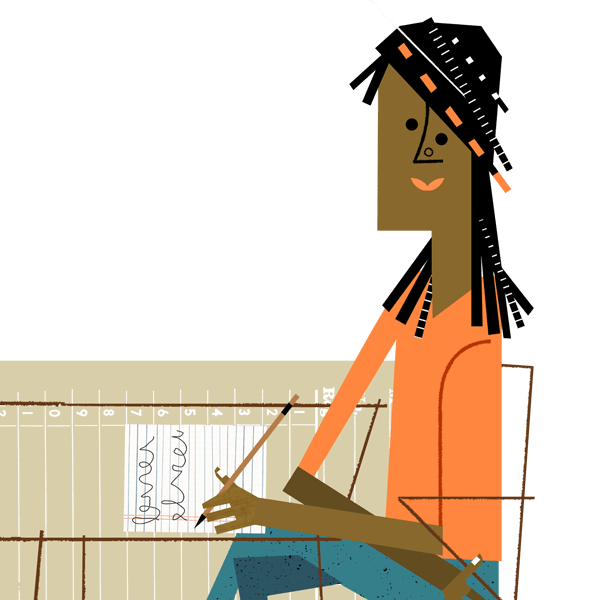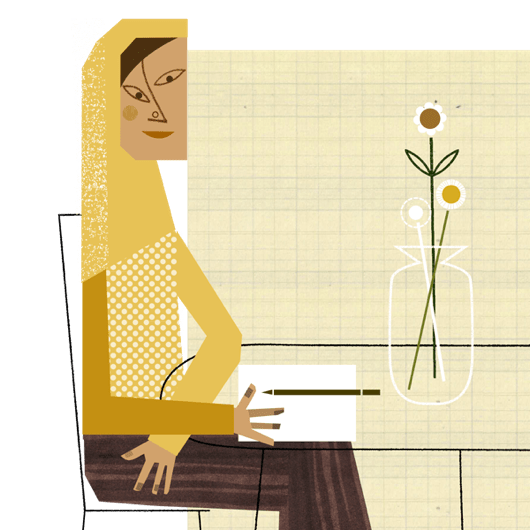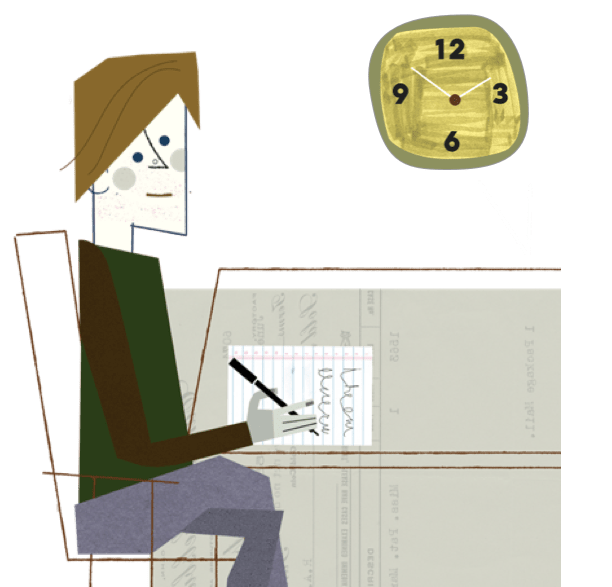
Day 1
Positive Self-Reflection

Welcome to the Mindful Practices 21-Day Well-Being Challenge! These daily self-care tips, inspirational quotes, and recommended activities will help you stay centered, motivated, and accountable.
On this first step of your journey, take a moment to reflect on all your positive qualities.
First: Take a deep breath, and think of a reason why you are proud of yourself.
Then: On a note card, record your positive qualities with words or an illustration.
Next: Sign and date your card.
Last: Place your card somewhere visible where you can leave it for 21 Days, like your bathroom mirror or refrigerator door.
Day 2
Be UNproductive

Sometimes the word productivity can seem like a straight jacket, a taskmaster. Being constantly “productive” can drive us into the ground if we let it. After all, we are human beings not human doings! Today, we invite you to spend some moments simply being. Do something just for the enjoyment of it; that is not motivated by what you have to show for it at the end. Get creative! Have fun! Let loose!
Day 3
Take Time to Journal

“Journaling is paying attention to the inside for the purpose of living well from the inside out.” –Bobby Knight
Journaling is a great way to help us achieve our goals, boost our emotional intelligence, heal from challenging experiences, and even become more confident. We challenge you to set aside ten minutes today, pick one or two of the prompts below, and give yourself permission to write without any judgment or pressure.
- What helps you feel present? What helps you feel at peace?
- What opportunities have come from a challenge you’ve experienced?
- What are some ways you practice self-acceptance?
- What is a choice you can make this week to serve yourself?
- What’s something you can do now that you weren’t able to do a year ago? How does it feel to recognize your growth?
Day 4
Move & Groove

“Change happens through movement. And movement heals.” — Joseph Pilates
The body holds onto stress in unhealthy ways. Physical activity is a great way to fight stress. When we move, endorphins (the body’s feel-good neurotransmitters) are released, having a positive effect on the entire body. Today we encourage you to get moving! You might play a game of basketball, do a yoga video at home, go to your local gym and take a swim, have a mini dance party in your living room, or go for a walk. Whatever you choose to do, know that your movement is having a direct effect on your wellness.
Day 5
Listen to a Podcast!

Podcasts are a hands-free, eyes-free form of entertainment and there are podcasts for just about any interest you could think of! Listening to a podcast while you take a walk, put away groceries, do the dishes, or fold laundry is a great way to make our daily workload feel lighter. It’s also a great way to cut down on screen time but learn about unique topics all at the same time! Greatist put together a list of the Top 10 self-care podcasts that could be a great place to start!
Day 6
Doodle Day!

“The creative process is a process of surrender, not control.” — Julia Cameron
Doodling is known to relieve stress, improve focus, and spark creativity. Find a piece of paper and start drawing! Don’t worry about how it looks or what you are creating, just draw. For inspiration try this.
Day 7
Inner Compass

“Our intention creates our reality” — Wayne Dyer
So often when our days are filled with stressful situations, it can feel like life is happening to us without anything being within our control. A daily intention practice can become an energetic “true north” – a point of grounding rooted in a choice you have made from the deepest truth of your heart. It sets the tone and can become something you return to over and over throughout the day. An intention can help align our beliefs, emotions, and actions which brings more integrity to our lives.
Take time today to ask yourself, “What in the deepest part of my heart do I wish to have in my life today?” When you have an answer, reframe it as if it is already happening. For example, if your answer is patience and peace it would become: “I am patient and I am at peace today.” Reflecting on your intention, take a few mindful breaths in and out.
Day 8
Stay Hydrated

“I try to start drinking water as soon as my feet hit the floor in the morning.” — Mary Kay Andrews
We all know it’s important to drink water throughout the day — water improves blood flow, increases energy levels, regulates your digestive system and improves skin tone.
Commit to staying hydrated by drinking habitually throughout the day. Incorporate it into your morning ritual and see where it takes you. Today, we encourage you to stay hydrated!
Day 9
Take a Walk!

“Walking is the great adventure, the first meditation, a practice of heartiness and soul primary to humankind. Walking is the exact balance between spirit and humility.” — Gary Snyder
Sometimes we find ourselves stuck inside all day, surrounded by floors, walls, and ceilings. Today we invite you to step away from the indoors and all that presses upon you from within its space. Instead, find the expansive sky to draw your gaze upward. Take a 15-minute walk. Take some deep breaths of the fresh air and be reminded of the beauty that surrounds us all, if we will only take notice.
Day 10
Leave Your Homework at School

Don’t bring work home over the weekend. Instead of feeling guilty that you didn’t get to catch up on work or clear your inbox on Sunday night, we challenge you to intentionally leave your backpack or work tote at school this Friday. Power down your laptop and allow yourself to be fully present with yourself and your family and enjoy the weekend!
Day 11
Equal Breath

A quick and calming breathing exercise, Equal Breath can help us when we are feeling confused, hyper, or upset.
First: Feel your feet firmly planted on the ground, roll your shoulders back and lengthen your spine. Close your eyes or look at a still point in your space.
Then: Notice the pattern of your natural breath. Notice the inhalations and the exhalations. Which is longer? Which is deeper?
Next: With your next breath, you can make your inhalation and exhalation the same length. Slowly count to 4 as you inhale. Slowly count to 4 as you exhale.
Last: Continue breathing this way for several minutes. You may like to experiment with changing the number you count. Your inhalation and exhalation should stay the same length.
Today we challenge you to take at least three equal breaths throughout your day.
Day 12
Make an Appointment

“Self-care means giving the world the best of you instead of what is left of you.” — Katie Reed
Trips to the dentist, routine doctor’s visits, and yearly eye exams are important. They provide major support for our quality of life and our long term health and well-being. We are responsible for our own health; having a trusted and trained medical professional on your team is a BIG plus. They are able to advocate for you, they can level with you about what they see, and they can offer counsel during times when clarity is needed. Don’t wait for something to break before taking the time to make sure the whole system is operating properly…
Day 13
Back to Basics

“Making your bed every morning is correlated with better productivity and greater sense of well-being” — Charles Duhigg
Taking care of ourselves isn’t always our first thought or instinct.
Sometimes by just reframing what Self-Care looks like/sounds like/ feels like, it can be easier to take those baby steps, start small, and appreciate all the ways in which we ALREADY care for ourselves.
Think about your morning routine: making the bed, preparing coffee, taking a shower, brushing our teeth, and even washing our hands. What will you do today that is a minimum to make sure YOU can be your best self?
Keep it going! Take a few minutes to write down a list of things that you find relaxing, calming, or joyful. It could be a bite of delicious chocolate, giving yourself a foot massage, singing your favorite song in the shower, or making a fresh cup of tea. Keep this list handy for moments when you need to destress.
Day 14
Declutter

“Minimizing can be exhilarating. If you continue decluttering, you just might find a zest for life that you didn’t know existed under all that stuff!” ― Lisa J. Shultz
An uncluttered learning space is a great advantage! We can take the same approach to our own living spaces and recognize the benefits that there are to decluttering:
-
- Find lost treasure
- Practice Self-efficacy and build confidence
- Reduce anxiety
- Cultivate a happy environment
- Reduce allergens in the space
Today we challenge you to take a reasonable amount of time (even 5-10 minutes) to start to address the clutter.
Day 15
Reconnect with Friends & Family

When our collective refrain is “I’m so busy, busy, busy” we can neglect people around us. Today, we challenge you to reconnect and reach out to your friends and family. Write a card or letter to someone who has been out-of-touch for a period of time or text/call someone who lives far away. We guarantee that this practice will not only make you feel good but will also brighten the day of the person on the receiving end, as well!
Day 16
Set a Task-Timer!

Sometimes the simple act of starting a task is more of a hurdle than actually completing the task. Pick one item that’s been on your to-do list forever, something small like changing a light bulb, organizing your junk drawer, or a quick closet clean-out.
Set your timer for 15 minutes and tackle the project. The timer helps this task feel manageable; you don’t need to worry that you don’t have the time to take on this one item from your to-do list because when the timer goes off, you’re done! Celebrate your accomplishment of completing a task that’s been nagging at you.
Day 17
Implement an Electronics Curfew

Help yourself wind down for a good night’s sleep by setting an electronics curfew. Our sleep cycles are heavily tied to light and research shows that the artificial light from electronics prevents the neurons and hormones that promote sleep. A good practice to help your ability to fall–and stay–asleep is to stop using these electronics 60 minutes or more before you plan to go to bed. Find another calming ritual to practice instead (make a mug of caffeine-free tea, read a book, take a bath, etc.) and notice any differences in your ability to wind down.
Day 18
Minute Meditation

Words are powerful. How we speak to ourselves and about ourselves (whether out loud or in our own minds) has a powerful effect on our self-esteem. Today, speak this mantra at the start, in the middle of, and at the end of your day. “Today I will find my center no matter what storms come my way. I will remember that how someone treats me is their choice, but how I respond is mine. I will choose to meet conflict with grace. Today I will be proud. I will remember I am powerful and resilient.” Once you conclude, take 3 deep breaths reflecting on what is happening in your body.
Day 19
Start a “Smile Pile”

A “Smile Pile” can be a physical or digital compilation of kind words you’ve received, cards, good memories, photos – any artifact that brings a smile to your face. Maybe you have a sweet drawing from your child, or a student wrote you a meaningful email. Maybe your partner left you a cute sticky note on the bathroom mirror or you have a picture of a pet that makes you laugh.
Compiling these into one file (endearingly referred to as a “Smile Pile”) that you can access if you’re feeling a little down, is a powerful way to remind you of more positive or joyous moments, and can help lift you up.
Day 20
Aim for the Goal

“If you want to be happy, set a goal that commands your thoughts, liberates your energy and inspires your hopes.” — Andrew Carnegie
Setting goals can be a helpful way to focus one’s energy, effort, and time. By choosing what is most important right now, in the near term, and in the long term, you can ensure that your priorities get addressed. Creating and achieving goals is also a simple and practical way to develop and maintain boundaries.
To create a short-term goal, consider something you wish to get done today, this week, this month, or even this year. And intentionally decide what state of presence you want to bring to the action (for example bring an attitude of gratitude to getting your taxes done or bring a feeling of service to washing dishes).
A long-term goal is something you want to do further in the future. Long-term goals require time and planning. Try working backwards from your long term goals. Think about what you want to achieve then plan steps going back to what you can do right now.
Day 21
Positive Self-Reflection with Memory Minute

On this final day of the 21-Day Well-Being Challenge, take a moment to reflect with our Positive Postcard activity:
First: Grab a post-it, index card or piece of paper.
Then: Place your feet firmly on the ground and roll your shoulders back. Close your eyes or look at a still point in your space. Visualize your deposit into your serenity bank account over the past 21 days. What does the deposit slip read?
Next: Set a timer for one minute and draw or illustrate all the reasons you are proud of yourself.
Last: At the end of the minute, take 3 slow exhales. Reminding yourself to be proud of all you have done.
The Mindful Practices Team is so proud of you for completing our well-being challenge!
We’d love to know what you thought and felt about the 21-Day Well-Being Challenge. Would you please click here to take a very brief survey? Thanks and Go YOU!!
